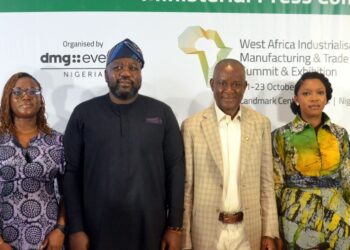Nigeria’s Gross Domestic Product (GDP) grew by 2.28% in real terms, in the third quarter (Q3) of 2019, up from 1.81% growth recorded in the third quarter of 2018. This means there was a 0.47% point increase in the growth of the Nigerian economy (year-on-year).
According to the data released by the National Bureau of Statistics (NBS), the Nigerian economy grew by 2.28% in Q3 2019, up from 2.12% growth recorded in Q2 2019. This indicates an increase of 0.16% points between Q2 and Q3 2019 (Quarter on Quarter).
Growth overview: A quick breakdown shows that the Oil sector grew by 6.49% from the 7.17% growth recorded in the previous quarter. This means the oil sector grew at a slower rate.
- On the other hand, non-oil GDP maintained a slow growth of 1.85% in Q3 2019, from 1.64% in the previous quarter.
- According to the report, Nigeria’s aggregate GDP stood at N37.8 trillion in nominal terms, an increase of 13.30% over the performance posted in Q3 2018.
The Oil Sector: In Q3 2019, the oil sector of the Nigerian economy posted a strong performance with a 9.40% point increase relative to the rate recorded in the corresponding quarter of 2018.
- Notably, the oil sector grew high by 6.49% in the Q3 2019, as against -2.91% dip recorded in Q3 2018. However, the latest growth in the sector showed a dip when compared to 7.17% growth recorded in Q2 2019.
- In terms of contribution, the oil sector contributed 9.77% to total real GDP in Q3 2019, up from 8.98% recorded in the corresponding quarter.

The Non-Oil Sector: The report shows that Nigeria’s non-oil sector contracted in Q3 2019. The non-oil sector grew by 1.85% in real terms during the quarter under review. This was –0.48% points lower than the figure recorded in the same quarter of 2018 (2.32%), but a 0.20% point higher than the second quarter of 2019 (1.64%).
- During the quarter, the growth in the non-oil sector was driven mainly by sectors which include agriculture, Information and Communication, accommodation and food services, transportation and storage,
- In terms of contributions to GDP, the non-Oil sector remains the biggest contributor to GDP.
- The sector contributed 90.23% to the nation’s GDP, lower than the share recorded in the third quarter of 2018 (90.62%).
Key Sectors’ performance: Major sectors that witnessed a decline in growth include trade sector and the real estate. Specifically, in real term, the trade sector contracted by -1.45% in Q3 2019, down from 0.98% in Q3 2018. The big contraction recorded in the sector may be largely attributed to the closure of the country’s land borders. Recall, that Nigeria closed its land border in August 2019.
- Also, the real estate sector continued in its low ebb as it contracted by -2.31%, from -3.84% recorded in Q2 2019, and -2.68% in Q3 2018.
- The industrial sector recorded the highest growth of 3.12% when compared with other sectors, followed by the agricultural sector which grew to 2.28%, while the service sector slowed down with a growth of 1.87%.
- On the other hand, the agricultural sector’s contribution to GDP improved to 29.25%, higher than the second quarter of 2019 which stood at 22.78%, this means that agriculture contribution in Q3 2019 rose by 6.46% points.
- The manufacturing sector grew by 1.10% in Q3 2019 from 1.92% in Q3 2018. This also means the sector slowed year-on-year.
- Also, the sector contribution to GDP stood at 8.74%, lower than the 8.84% recorded in the third quarter of 2018 and the 9.08% recorded in Q2 2019.
The Key takeaways: GDP is Nigeria’s biggest economic data, and it measures the monetary value of everything produced in the country. It depicts the nation’s total economic activity. A decline in GDP means major economic activities are slow or sluggish, which may be a result of several factors.
- For the latest data, the economic growth of 2.28% shows an improved performance when compared to the third quarter of 2018 (1.81%). According to NBS, the improvement in GDP was likely aided by stability in oil output.
- However, the 2.28% GDP growth suggests the economy posted the biggest growth in the year.
- Meanwhile, the service sector recorded the slowest growth in the year. This is not good for the economy as the sector represents the largest contributor to the nation’s GDP.
- On the positive side, the industrial sector posted the biggest growth for the past six quarters.
- Expectations are high for the Nigerian economy as the world bank’s 2.1% annual growth forecast for 2019 may eventually be surpassed.
- Meanwhile, spill-over effects of the border closure may pose a further threat to the economy going into 2020.























“This means the economy grew by 0.47% points (year on year).” This sentence is a bit misleading and inaccurate. It doesn’t mean the economy grew 0.47% YoY, it means that there was a 0.47 percentage points increase from the growth figure of Q3 2018 to Q3 2019. The economy grew 2.28% YoY! There is a huge difference between those two points; growth rate is higher this year (Q3) than last (Q3) by 0.47 percentage point vs the economy grew by 2.28% this year (Q3) in comparison to last (Q3)! 🙂 But in the rest of the article, you got it correct sha!
Contraction in trade sector, perhaps, suggests that border closure represents a drag on the Nigerian economy